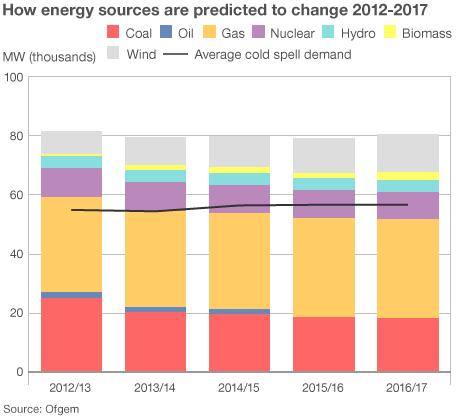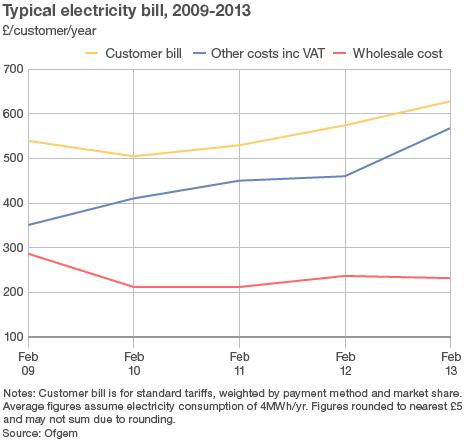Energy watchdog Ofgem chief warns of bill rises
- Published
- comments
Alistair Buchanan: "We will be very tight on power station capacity in three to five years time"
Consumers are being warned they face higher energy bills as the UK becomes more reliant on energy imports.
The warning comes from Ofgem chief executive Alistair Buchanan, who says falls in the UK's power production capacity are likely to lead to more energy imports and price rises.
The energy watchdog predicts power station closures could mean a 10% fall in capacity by April alone.
Mr Buchanan has said the UK needs more gas supplies to fill the shortfall.
His warning comes as older power stations close and renewable energy is still growing.
Global market
Existing plans to take ageing and polluting power stations off the UK network over the next few years mean the amount of energy the UK can produce is set to fall.
The BBC's John Moylan says that, while we have heard such warnings before, the difference with this one is that the process is already underway. Plants are already closing, and although planning permission for new ones is out there, nothing is actually being built.
While the shortfall in supply can be filled by increasing gas imports, competing for those supplies on the global market is likely to cost more.
Longer-term solutions to the UK's energy needs, such as new nuclear power stations or tapping domestic shale gas reserves, have yet to be given the final go-ahead by the government.

Mr Buchanan told the BBC that Britain "would be very tight on power station capacity in three to five years' time".
"We're going to have to go shopping in world markets at a time when they will be very tight [on supplies] themselves."
"There isn't a single person or people to blame. In my view it was a single event - the financial crisis. Before the financial crisis the government had backed a visionary approach to energy on wind, water and nuclear... then came the financial tsunami."
He said that crisis had a major impact on the government's ability to pay for such expensive schemes.
Plugging the gap
Mr Buchanan added that it was very important to resolve "leaky homes" and become more energy efficient in order to avoid the approaching "near crisis".
Charles Hendry MP: We do need to rebuild our energy infrastructure
He is stepping down as Ofgem chief executive later this year.
A spokesman for the Department of Energy and Climate Change said that "we cannot afford to be complacent".
"The reforms we are making to the electricity market through the Energy Bill and through our gas generation strategy are aimed at plugging this gap in order to keep the lights on," he added.
Analysts said there was little chance of the UK running out of gas.
"We must not fear," said Ashton Berkhauer, the deputy chair of Energy Forecaster, which gives companies advice on their energy bills.
"The UK is very well connected. We have a number of different inter-connectors based all around the country as well as huge import facilities."
However, he added that both consumers and businesses "need to make sure they are not using more than they need to".
The chief executive of Consumer Focus, Mike O'Conner, warned that it would be those who can least afford it who would suffer the most.
"With six million households in fuel poverty, rising to over nine million by 2016, and an increasing proportion of our incomes being spent on essential items like energy, this latest news... is chilling."
Caroline Flint, Labour's shadow energy and climate change secretary, said it was important for the UK to have an energy market that "delivers fair prices and works in the public interest".
She said Labour had plans to create "a tough new energy regulator with the power to force energy companies to pass on savings to consumers".
"We must also prioritise making Britain's homes better insulated and more energy-efficient," she added.

- Published25 July 2011
- Published27 July 2011
- Published26 January 2013
- Published17 December 2012
- Published29 November 2012
- Published23 November 2012